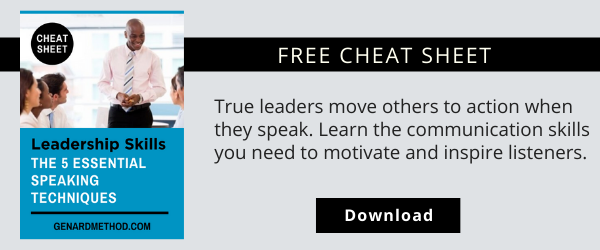Want to know how to speak effectively for career success? Whether it's job interview skills, a formal presentation, or selling your ideas, speaking with precision and impact will help you become more visible, memorable, and ultimately more successful.
A report appearing on Ohio University's web site by Right Management is helpful in this respect. It's called the "Top Five Communication Skills Essential to Career Success." These practices are, indeed, part of effective speaking skills on your part. Since they are all essential components of the public speaking practices I teach, I'd like to discuss them in this article. (To learn how to prepare an effective speech when you have little time to prepare, download my free cheat sheet, "How to Prepare a Speech in 15 Minutes.")
The 5 essential skills are:
- Conciseness of Answers
- Structure of Answers
- Logical Flow of Information
- Eye Contact
- Clarity of Speech
These skills constitute the core of speaking skills in terms of developing and presenting your message. At Public Speaking International, they are part of the work we do with clients to help them conceive and present their critical information successfully. Let's take a look at how you can use each skill to engage, inform, and inspire your listeners. To do so, you should:
Speak Concisely. Few things will dissipate the power of your argument more than a meandering exposition that goes nowhere . . . slowly. Conciseness, on the other hand, gives evidence of a crisp and insightful mind. In my former field of acting, performers are taught to "always leave the audience wanting more." The opposite will surely take place if you speak without definition, and seemingly, without an end goal in sight. Try an exercise we use at PSI: give yourself just one minute to jot a few notes on a topic, and one minute (be disciplined!) to speak on it. Videotape yourself. If you think after your first try, "But I didn't get to the topic!" then you'll know just how far you have to go.
Structure Your Answer. You need to shape your speech, not just deliver information. Whether you're speaking for thirty seconds or two hours doesn't matter: a well-organized response to a question or topic is easier both to follow and retain. Here's a helpful hint: when a listener or audience is biased toward you, feel free to give your important message up front and then back it up with evidence. But when listeners are biased against you, take care to establish common ground, then build your argument brick by brick. You'll be harder to resist that way.
Be Logical. Speakers often forget that although they themselves know the reasoning behind their arguments, audiences don't. Audience members, don't forget, are hearing you speak for the very first time, and so they need to be led to the conclusions you want them to arrive at. A logical argument is a pleasure to listen to, while argumentation filled with fallacies or errors in logic can be frustrating or infuriating. Particularly helpful for a well reasoned argument are transitions, so pay attention to yours (many speakers are weak in this area). The illustration I use is that the logic of your talk should be like a snake, sinuously moving through your talking points without ever "leaving the ground," not like an insect hopping from brilliant bloom to brilliant bloom.
Make Solid Eye Contact. Did you know that a listener uses more frequent eye contact than a speaker? Think about it: when you're talking about something you're recalling, don't you look away as you're trying to retrieve the exact information you need? This fact is one reason why we need to consciously work toward establishing and maintaining solid eye contact with the people we're speaking to. As I say to clients, "When was the last time you bought something from someone who wouldn't look you in the eye?" Remember: you're always selling something to your listeners, whether it's a product, service, course of action, or an idea.
Speak Clearly. If you have the slightest idea that you may not speak clearly, with crisp articulation and effective delivery, the chances are reasonable that you don't. We Americans are lazy speakers, leaving out consonants that occur in the middle of words and pronouncing our "t"s as "d"s. For instance, the word is "government," not "goverment, and certainly not "govermen." Hear how lovely the word sounds when pronounced fully? Forget tongue twisters: here are three exercises that will give you more effective articulation. To speak well, also pay attention to supporting the sound until the end of the phrase; that is, don't let the last words trail away. In English, the most important word usually comes at the end of the sentence. So don't forfeit the opportunity to give your audience the full impact and full flavor of your ideas.
Key takeaways from this blog:
- Speaking with precision and impact is an excellent career enhancer!
- Be concise, and you'll give the impression of a clear and insightful mind.
- Shape your speech and be logical, and audiences will follow you easily.
- To sell your product, service, or ideas, you need to use solid eye contact.
- Be sure to speak clearly, and support your sound to the end of the phrase.



